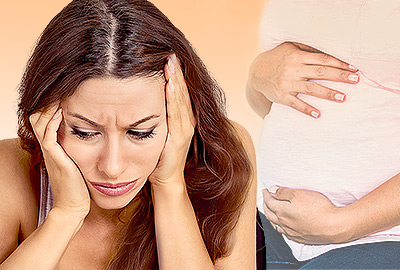
Mood swings are an uncomfortable part of life, and they have been reported to affect as many as 50% of women in the United States. The causes of mood swings are generally hormonal, but these hormone shifts may be caused by several factors.
Hormonal Causes of Mood Swings
Mood swings are characterized by extreme changes in mood, usually from states of euphoria to depression. Someone experiencing a mood swing oftentimes reacts to a trigger but may respond inappropriately and to the frustration of those around them.The following possible causes reflect the strong connection between mood swings and hormonal fluctuations.
Premenstrual Syndrome
More commonly referred to as PMS, this is a stage weeks prior to menstruation. While every woman experiences PMS differently, a large majority report mood swings as one of their premenstrual symptoms.
Pregnancy
During pregnancy, a woman's body undergoes a huge transformation on both a physical and hormonal level. The shifts in hormones can cause mood swing episodes.
Menopause
Mood swings are one of the most common symptoms of menopause. While they can be frustrating and confusing for the women experiencing them, they tend to disappear soon after a woman has reached menopause and hormone levels are balanced.
Other Causes of Mood Swings
Moods swings are a common symptom during menopause, but in some cases mood swings episodes may indicate more serious conditions.
Anxiety
Anxiety is defined as a pervasive feeling of worry and can be either short-term or chronic. Anxiety in any form can cause mood swings.
Depression
Depression is a serious medical condition that exhibits a variety of symptoms like intense feelings of sadness and despair accompanied by mood swings. If it is not treated, depression can significantly impact daily life and can be very detrimental to a person's overall well-being.
Mood Swings Triggers
Chronic Stress

Different from every day minor stress, chronic stress occurs when an external factor — long-term financial strains or prolonged illness — inhibits a person's natural ability to maintain biological functions, including regular hormone levels. Chronic stress is a relatively common cause of mood swings.
Lack of Sleep
It is important that people of all ages get the recommended 7 to 8 hours of sleep each night. Sleep gives the body a chance to recharge and maintain full functionality. Unfortunately, lack of sleep is widespread and is related to mood swings episodes.
More Information
These are just some of the most common causes of mood swings. Women should discuss all symptoms with a doctor to determine their diagnosis. For more information on mood swings and how to treat them, follow the links below.
Sources
- "Adult Mood Swings". The Health Center. www.thehealthcenter.info.
- Amin, Zenab, Turhan Canli, and C. Neill Epperson. "Effects of Estrogen-Serotonin Interactions on Mood and Cognition". Behav Cogn Neurosci Rev 2005; 4; 43.
- Dr. Love, Susan, and Karen Lindsey. Dr. Susan Love's Menopause and Hormone Book. New York: Three Rivers Press, 2003.
- "Estrogen Promotes Gender Difference in Brain's Response to Stress". Molecular Psychiatry. www.psycheducation.org.



